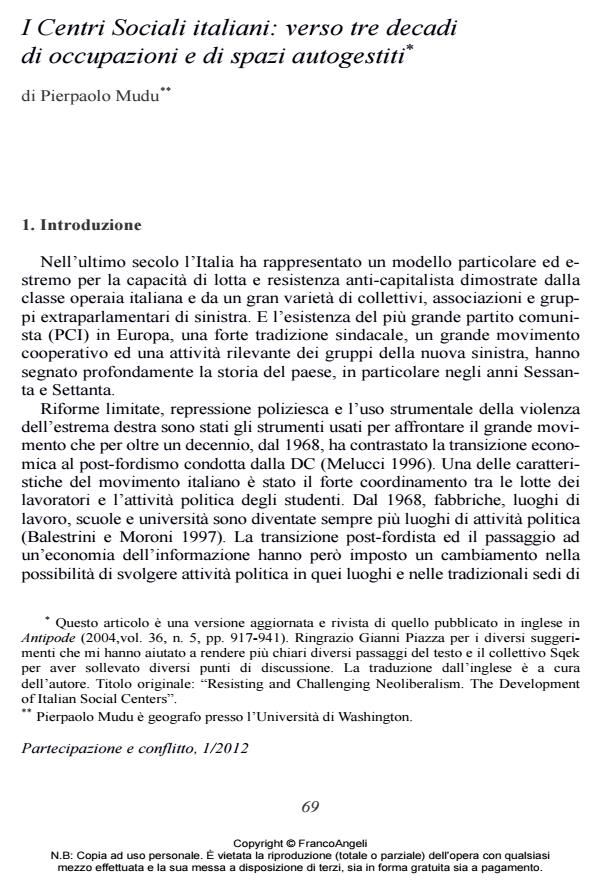Italian Social Centers: toward three decades of squatting and selfmanagement
Journal title PARTECIPAZIONE E CONFLITTO
Author/s Pierpaolo Mudu
Publishing Year 2012 Issue 2012/1
Language Italian Pages 24 P. 69-92 File size 424 KB
DOI 10.3280/PACO2012-001004
DOI is like a bar code for intellectual property: to have more infomation
click here
Below, you can see the article first page
If you want to buy this article in PDF format, you can do it, following the instructions to buy download credits

FrancoAngeli is member of Publishers International Linking Association, Inc (PILA), a not-for-profit association which run the CrossRef service enabling links to and from online scholarly content.
In the 1970s, Italy experienced a difficult crisis that marked the end of the economic model carried out after world war two. The resulting changes in production relations led to the disappearance of traditional public spaces and meeting places such as open squares, workplaces, party offices or the premises of left extra-parliamentary groups. Within this context, in the 1980s and 1990s, these groups managed to create new social and political spaces by setting up Self-Managed Social Centers, ie squatted properties which became the venue of social, political and cultural events. In Italy, over 300 Social Centers have been active over the past 25 years, especially in urban areas. Their organizational modes indicate examples of successful direct democracy in non-hierarchical structures and may provide alternative options to the bureaucratic organization of so many aspects of social and political life. Social Centers have turned abandoned places into public spaces relying mostly on collective action, that is cooperative working modes which do not come under the provisions governing regular employment contracts. Their actions explicitly contest marginalization and exclusion processes which are becoming more and more fierce in our cities. An analysis of the evolution of this original Italian movement provides the opportunity to address a number of issues associated with alternative practices to neoliberal globalization.
Keywords: Self-management, squatting, social movements, public space, Italy
- Young People Re-Generating Politics in Times of Crises Nicola De Luigi, Alessandro Martelli, Ilaria Pitti, pp.253 (ISBN:978-3-319-58249-8)
- Housing Movements in Rome Carlotta Caciagli, pp.167 (ISBN:978-981-16-2737-8)
- Housing Movements in Rome Carlotta Caciagli, pp.115 (ISBN:978-981-16-2737-8)
- Action sociale partisane, ethnicisation et citoyenneté culturelle en Italie du Sud Florian Pietron, in Lien social et Politiques /2024 pp.111
DOI: 10.7202/1109663ar - Il diritto all'abitare fra istituzioni e cittadini: il movimento di lotta per la casa a Roma Cinzia Pietramala, Maria Carla Sicilia, in WELFARE E ERGONOMIA 1/2015 pp.66
DOI: 10.3280/WE2015-001007 - Social Centers in Southern Italy: The Caserta Ex‐Canapificio Between Illegality, Migration, and Rurality Romain Filhol, in Antipode /2018 pp.523
DOI: 10.1111/anti.12285 - ‘Boxing Is Our Business’: The Embodiment of a Leftist Identity in Boxe Popolare Lorenzo Pedrini, in Societies /2018 pp.85
DOI: 10.3390/soc8030085 - New Metropolitan Perspectives Francesca Sabatini, pp.94 (ISBN:978-3-031-06824-9)
- From Contention to Co‐governance: The Case of the Right to Inhabit Movement in Rome (2000–2013) Alejandro Sehtman, in Antipode /2018 pp.456
DOI: 10.1111/anti.12283 - Leading the left: sociability and the micropolitics of cultural reproduction in grassrootsboxe popolarecoaching Lorenzo Pedrini, David H. K. Brown, Gabriele Aimini, in Sport, Education and Society /2020 pp.889
DOI: 10.1080/13573322.2019.1672147 - Marginal urbanities in Rome – or how to revive urbanity through self-management Simone Ranocchiari, in Geographica Helvetica /2025 pp.409
DOI: 10.5194/gh-80-409-2025 - Beyond Europe: Alternative visions of Europe amongst young activists in self-managed spaces in Italy Chiara Milan, in European Journal of Cultural and Political Sociology /2020 pp.242
DOI: 10.1080/23254823.2020.1794922 - Contested Cities and Urban Activism Gianni Piazza, Federica Frazzetta, pp.199 (ISBN:978-981-13-1729-3)
- Espace et rapports de domination Pierpaolo Mudu, Leslie Talaga, pp.81 (ISBN:978-2-7535-6398-8)
- Rebelling Against Time: Recreational Activism as Political Practice Among the Italian Precarious Youth Chiara Milan, in American Behavioral Scientist /2019 pp.1519
DOI: 10.1177/0002764219831744 - Fighting gentrification from the boxing ring: how community gyms reclaim the right to the city Chiara Milan, Stefania Milan, in Social Movement Studies /2021 pp.722
DOI: 10.1080/14742837.2020.1839406
Pierpaolo Mudu, I Centri Sociali italiani: verso tre decadi di occupazioni e di spazi autogestiti in "PARTECIPAZIONE E CONFLITTO" 1/2012, pp 69-92, DOI: 10.3280/PACO2012-001004